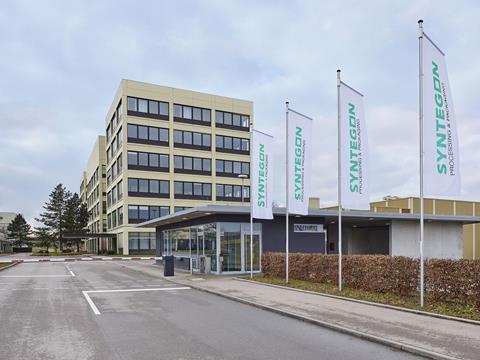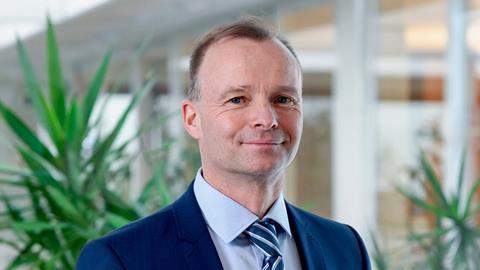In an exclusive interview with Fin Slater, Dr Michael Grosse, Syntegon’s newly minted CEO, talks strategic priorities, sustainability perspectives, and the challenges of rebranding an iconic and established organisation.
Until early January, Syntegon had been trading as Bosch Packaging Technology for 50 years. What was the reasoning behind a complete rebrand and what challenges does this pose to an established company like Syntegon?
At the beginning of this year, Syntegon presented itself as an independent company under a new brand. Processing and packaging for a better life - that is our mission. We remain a global partner for the pharmaceutical and food industries and provide our customers with even more intelligent and sustainable solutions.
The main reason for the brand change is that our company is no longer part of the Bosch Group. Our new owner is the private equity and investment advisory firm CVC Capital Partners. With Bosch, of course, we are losing a famous brand with high appeal. However, as Syntegon we will sharpen our profile as a leading processing and packaging company and use the opportunity to optimize our products and services as well as our structures and processes to make them an even better fit for our customers.
Can we expect any significant changes in direction following the rebrand and change of ownership?
With up to 150 years of experience in individual machines, systems, and services, Syntegon sets standards when it comes to developing innovative packaging and processing solutions and delivering tailored manufacturing processes designed to make high-quality products with utmost reliability. Our customers appreciate us for our reliable machines that enable smooth, efficient, and safe production. In the future, we want to further extend these close partnerships with our customers.
We will inspire the food and pharma industry with future-oriented solutions and contribute to the overall economic success of our customers. The newly gained independence enables us to be faster and even more flexible. While we used to be part of a large corporation with different divisions and a fixed organizational structure, Syntegon can now create a business framework that is leaner and an even better fit for the industry with a stronger focus on the key challenges and demands of our customers.
What do you identify as your strategic priorities as a business over the coming year?
“Customers first” is our motto. Driven by the spirit of partnership with our customers, we are striving to improve the value of our solutions as well as our processes. We want to become faster and easier to do business with. This ambition includes, for example, reducing response times to customer enquiries or improving our service delivery. We will build on our deep technical expertise and application knowledge, paired with a comprehensive portfolio of products and services, driven by our relentless aim to become better, faster, and more efficient in everything we do.
Of course, the coronavirus is on everyone’s mind and unites us in acting safely and responsibly. We have to lead our company, partners, and families safely through this unprecedented crisis. Since the beginning, Syntegon has been continuously and closely monitoring the developments related to the spread of the virus. We regularly evaluate and adapt our actions in line with our values to never compromise the health and safety of our people.

Sustainability is a topic that is currently dominating packaging-related discussions. What can machinery manufacturers like Syntegon do to help produce eco-friendly packaging solutions? How is Syntegon contributing to the needs of sustainability in terms of its packaging machinery portfolio and R&D?
Syntegon's vision is to develop intelligent and sustainable solutions for everyone. We see it as our responsibility to deliver technology that can process the most environmentally friendly materials as efficiently as possible while using as few resources as possible. We support our customers on the path to a sustainable future with material testing, machine applications, innovative packaging designed to meet the requirements of products, transport modes, and regional circumstances.
In primary packaging, we are pursuing two approaches to produce sustainable packaging: one is to use mono materials rather than conventional multilayer films, and the other is to use paper packaging as an alternative to plastic. By producing narrower sealing seams, we can realize considerable additional material savings. Technologies like amplified heat sealing or ultrasonic sealing support these approaches. Secondary packaging, which is usually made of cardboard anyway, is primarily about making it even more suitable, robust, and variable for e-commerce applications. Moreover, we relieve recycling flows by not using glue.
Bosch, Syntegon’s former parent company, has pledged to become carbon neutral by 2020. Does Syntegon have any similar aspirations towards carbon neutrality?
Our mission “processing and packaging for a better life” also includes keeping our ecological footprint as small as possible. Syntegon has more than halved its energy consumption relative to the value added in the past ten years, and we will continue our efforts to save energy and emissions. Our focus is on further improving energy efficiency and increasing the share of renewable energies. Since this year, for example, all of our European production sites have been sourcing “gold standard green electricity” from renewable energies. In addition, we are continuously working on improving the energy efficiency of our machines. In this way, we also contribute to a better environmental balance for our customers.
Other than sustainability, what are the key market drivers in the packaging/CPG industry to which Syntegon will respond?
Consumer markets are becoming more and more volatile. The number of products that dominate markets for extended periods will continue to dwindle as product life cycles shrink. Competition will intensify as new manufacturers penetrate the food market with innovative products and services.
For the pharmaceutical industry, we see two major developments: on the one hand, specialized drugs will be produced in lower quantities for small patient populations. On the other hand, the price pressure on generics will continue to rise, as will regulatory quality and data standards. The challenge for our customers is to respond quickly to changing requirements, bringing products to market much faster without jeopardizing quality and their long-term planning.
Syntegon provides the right answer to these challenges with highly flexible equipment. Designed to start manufacturing immediately without long lead and delivery times, they are ready to accommodate additional options and retrofits. We offer flexible machines that process a wide range of packaging materials. Whenever the need arises, we can respond to changing customer requirements for materials, product formats, volumes, and speed. We have modular systems at our disposal that facilitate fast delivery and immediate commissioning. Our teams of experts advise and assist customers in the design of production lines, materials, and product flow.

We've previously reported on Syntegon's collaboration with BillerudKorsnäs. What is the importance of partnerships like this to accelerating innovation for the packaging industry, and can we expect more of the same from Syntegon in the coming months?
Of course, we are working closely with leading packaging material suppliers – in both paper and plastic. We believe that solutions can only be developed in close cooperation with material experts as well as users and brand suppliers. Together with our Swedish cooperation partner BillerudKorsnäs, we have developed a new packaging concept called Shaped Paper Pod, which enables creative and sustainable packaging solutions made of paper.
The Shaped Paper Pods are produced with BillerudKorsnäs’ FibreForm paper on a newly developed Syntegon paper form machine. Based on organic materials, the FibreForm paper enables up to ten times deeper embossing than conventional paper. This creates eye-catching 3D effects. Sandwich spreads, confectionery, cookies, facial cream – the possibilities are many and diverse. Manufacturers are moving towards plastic-free solutions with predominantly fibre-based packaging materials that are tailored to their given product.
You were previously on the board at Tetra Pak – what learnings from that role will you be bringing to your new role as CEO of Syntegon?
During my almost 17 years at Tetra Pak, I had the privilege to deepen my understanding of the key challenges of the food production industry and how to leverage technology, innovation, and services to address them. Know-how is the entry ticket, but the passion, the focus, and mindset of the people really make the difference.
You’ve talked about your desire to focus on improving customer satisfaction and profitability – do you have any particular initiatives/strategies in mind to help you do this?
Everything we do according to our mission “processing and packaging for a better life” is about creating value for our customers and will determine their satisfaction with our products and services. That is why we are focusing even more on the value and reliability of our services and want to deepen the spirit of trustworthy and caring partnerships with our customers.
Profitability is a key aspect of a company's future viability. Our financial strength through sustainable profitable growth determines our ability to attract the best talents and to invest in our own and our customers’ future. We therefore have to sharpen our focus on what really matters and simplify our operating model.

















